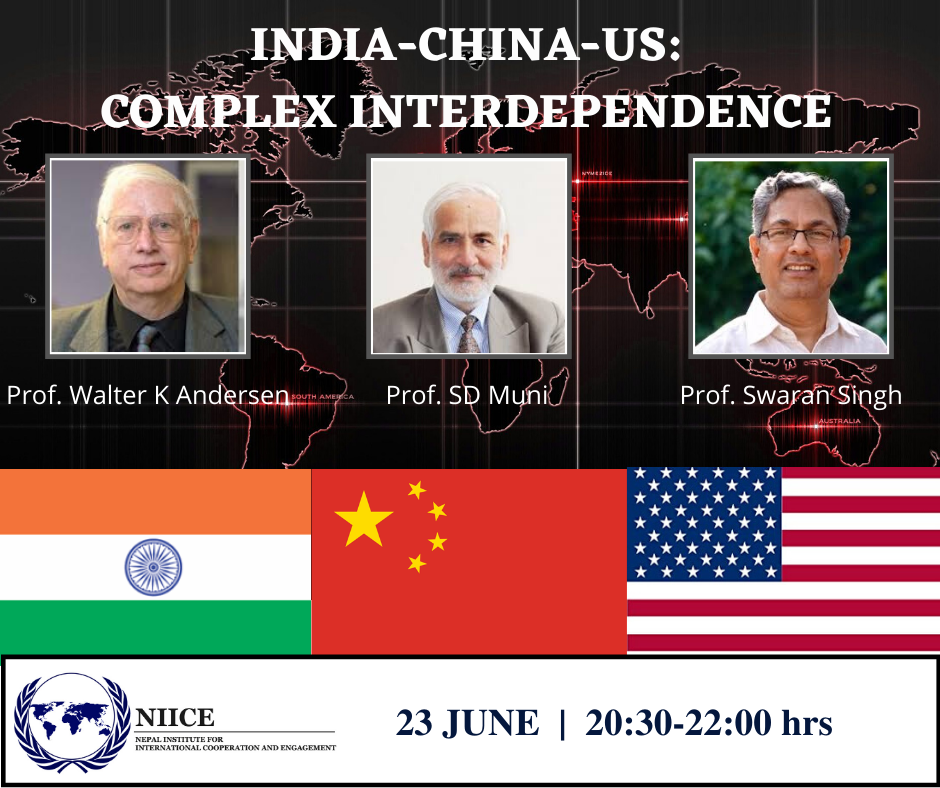
India-China-US: Complex Interdependence
About the Speakers
Prof. Walter K Andersen
Walter K Andersen is Professor of South Asia Studies, School of Advanced International Studies (SAIS), Johns Hopkins University. Prior to joining the SAIS, he served as chief of the US State Department's South Asia Division in the Office of Analysis for the Near East and South Asia. The author published numerous books and articles throughout his career, ‘The Brotherhood in Saffron’, ‘RSS’ and many. Andersen earned his Ph.D. in political science from the University of Chicago. As a part of his field work, he lived in India for four years from late 1960s through early 1970s. There he came in contact with Akhil Bhartiya Vidyarthi Parishad (ABVP, the student wing of RSS). That association led to an introduction to M. S. Golwalker – the head of RSS. His scholarship has focussed on the RSS and Indian politics. He considers Lloyd and Susanne Rudolph as his mentors.
Prof. S D Muni
Professor S.D. Muni is member of IDSA's Executive Council. For nearly forty years, he taught, conducted and supervised research, in International Relations and South Asian Studies at Jawaharlal Nehru University (1974-2006), National University of Singapore (2008-2013), Banaras Hindu University (1985-86), and University of Rajasthan (1972-73). He served as India's Special Envoy to SE Asian countries on UNSC Reforms (2005). Prof. Muni was nominated to the first ever constituted National Security Advisory Board of India during 1990-91. He was the founding executive member of the Regional Centre of Strategic Studies, Colombo, Sri Lanka, and also served on the Executive Council of the Institute for Defence Studies and Analyses (IDSA), New Delhi, India. In 2005 he was bestowed with 'Sri Lanka Ratna', Sri Lanka's highest national honor for a foreign national. The Institute of National Security Studies Sri Lanka, Colombo, offered him affiliation as Honorary Distinguished Fellow in 2016. In October 2014, he also received the “Life Time Achievement Award” from Shri Venkateshwara University, Tirupati, A.P, India. He has been sitting on selection committees for appointment of Vice-Chancellors and Faculty members in various Universities. He was invited to address the UN Special Committee on Indian Ocean as a Zone of Peace at Sochi, then as part of the Soviet Union, in 1985.
Author and editor of nearly thirty books & monographs and more than 200 research papers, Prof. Muni was also the founder editor of two prestigious quarterly Journals in India, The South Asia Journal (Subsequently renamed as South Asian Survey launched by Indian Council for South Asian Cooperation), and Indian Foreign Affairs Journal (For Association of Indian Diplomats). Prof. Muni has travelled extensively.
Professor Swaran Singh
Dr. Swaran Singh is a Professor and Chair at the Centre for International Politics, Organisation and Disarmament, School of International Studies at JNU, New Delhi. He is the President of Association of Asia Scholars, general secretary of Indian Association of Asian and Pacific Studies and visiting professor at the China West Normal University and many other esteemed institutions like Sciences Po (France), Australian National University (Canberra) and others. He is the adjunct senior fellow at the Charhar Institute (Beijing), Institute of National Security Studies, Sri Lanka and Sichuan University, Jinjiang College. He also is on the editorial board of Asian Policy and Politics (Washington Dc) and advisory board member of Atlanta-based Communities without Borders Inc. (USA). He has published various articles and contributes daily for print and visual media at home and abroad. He has written for many reputed journals like Journal of International Affairs (Columbia University), Journal of Indian Ocean Region (Perth University) and others. He also co-edited Colonial Legacies and Contemporary Studies of China and Chineseness (2020), Corridors of Engagement (2019), and authored Nuclear Command and Control in Southern Asia: China, India, Pakistan (2003), China-India Economic Engagement: Building Mutual Confidence (2005) and many others.

Recent Comments